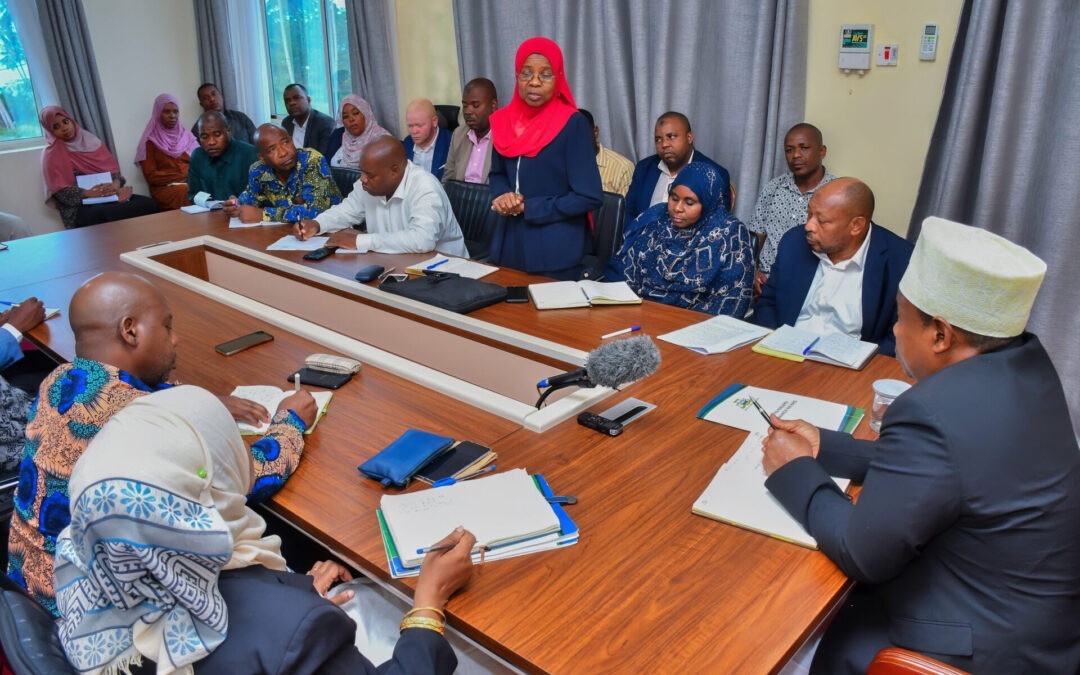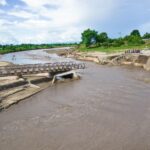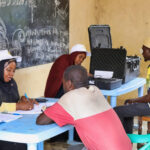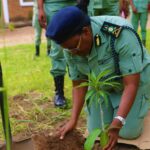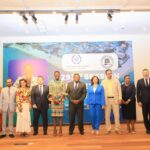Prime Minister Othman Masoud Othman Convenes Environmental Leaders for Green Zanzibar Initiative
On 7 October 2024, Othman Masoud Othman, Prime Minister of Zanzibar, convened a crucial meeting with environmental leaders and stakeholders from various government institutions. The meeting was held at the Office in Migombani, Urban Region-West Unguja. The meeting’s primary objective was to conduct a joint assessment of the recent environmental visit to Unguja and Pemba. This assessment was conducted with the overarching goal of advancing the Government’s Inheritance Program Green Zanzibar, also known as the Zanzibar Green Legacy.

The meeting brought together a diverse group of participants, including representatives from environmental agencies, local government officials, and community leaders. This collaborative approach was essential for addressing the multifaceted environmental challenges facing Zanzibar in an effective manner. The Prime Minister highlighted the need for a unified approach to address key environmental challenges, including deforestation, coastal erosion and waste management.
During the session, comprehensive reports from the recent environmental visit were presented. The reports outlined both the achievements and areas for improvement in the ongoing conservation efforts. The meeting included discussions on the implementation of best practices and innovative solutions to enhance environmental sustainability. Furthermore, the participants examined methods for more effectively engaging local communities in conservation activities, recognising the crucial role of grassroots involvement in the success of the Zanzibar Green Legacy.
The Prime Minister, Othman Masoud Othman, reaffirmed the government’s commitment to environmental stewardship and sustainable development. He emphasised that the Zanzibar Green Legacy is not merely a government initiative, but rather a collective responsibility that necessitates the active involvement of all stakeholders. The meeting concluded with a renewed sense of purpose and a clear action plan for the next steps in achieving the goals of the Zanzibar Green Legacy.
This gathering highlighted the importance of collaboration and shared responsibility in creating a sustainable future for Zanzibar. The meeting provided a valuable opportunity for diverse perspectives and expertise to be brought together, laying a strong foundation for continued progress in environmental conservation and sustainable development.
Joint Assessment of Environmental Visit
During the session, participants undertook a comprehensive review of the environmental conditions observed during the recent visit to Unguja and Pemba. This review was a crucial element of the meeting, as it offered a comprehensive assessment of the environmental situation in these regions. The discussions were comprehensive and addressed both the challenges and opportunities for sustainable development.
Identifying Key Environmental Challenges
The assessment identified a number of critical environmental issues that must be addressed in order to achieve the objectives of the Zanzibar Green Legacy. These challenges included deforestation, coastal erosion, pollution and the loss of biodiversity. The meeting saw participants discuss the impact of these issues on local communities and ecosystems, with a focus on the need for immediate and coordinated action.
Opportunities for Sustainable Development
In addition to identifying challenges, the assessment also explored potential avenues for sustainable development. The participants discussed a range of potential strategies and initiatives that could be implemented to promote environmental conservation and sustainable resource management. These included reforestation projects, the development of sustainable agricultural practices, and the promotion of ecotourism. The objective was to identify solutions that would not only safeguard the environment but also foster the economic and social prosperity of local communities.
Aligning Efforts with the Zanzibar Green Legacy
The objective of the discussions was to align all efforts with the overarching goals of the Zanzibar Green Legacy. The objective of this initiative is to create a sustainable and green future for Zanzibar by promoting environmental conservation, sustainable resource management, and the overall well-being of the islands’ natural ecosystems. It was highlighted by participants that a holistic approach, integrating environmental, economic and social considerations, is of paramount importance.
Collaborative Approach
A key focus of the assessment was the importance of collaboration in achieving the desired outcomes. It was acknowledged by all participants that the achievement of the Zanzibar Green Legacy goals is contingent upon the active involvement of all stakeholders, including government institutions, local communities and environmental organisations. The session encouraged a collaborative approach, with participants agreeing to work together to achieve shared objectives.
Action Plan and Next Steps
The session culminated in the formulation of a comprehensive action plan and a clear roadmap for future steps. The plan set out detailed actions to be taken in order to address the challenges identified and to capitalise on the opportunities for sustainable development. It was agreed that ongoing monitoring and evaluation is essential to ensure the effectiveness of the initiatives and their alignment with the goals of the Zanzibar Green Legacy.
The joint assessment of the environmental visit to Unguja and Pemba was a crucial step in advancing the Zanzibar Green Legacy. By identifying the key challenges and opportunities and fostering collaboration among stakeholders, the session has established a robust foundation for sustainable environmental management and development in Zanzibar.
Objectives of the Zanzibar Green Legacy
The Zanzibar Green Legacy initiative represents a core component of the government’s environmental policy, with the objective of establishing a sustainable and green future for Zanzibar. This ambitious programme has been devised with the objective of addressing the pressing environmental challenges currently facing the islands, while simultaneously promoting a holistic approach to environmental conservation and sustainable development.
Preserving Natural Resources
One of the core objectives of the Zanzibar Green Legacy initiative is the preservation of natural resources. This encompasses the safeguarding of forests, water bodies and marine ecosystems, which are essential for maintaining the ecological balance and the livelihoods of local communities. We are implementing sustainable practices in agriculture, fishing, and forestry to ensure responsible use of these resources and their availability for future generations.
Reducing Environmental Degradation
The initiative places significant emphasis on the reduction of environmental degradation. This involves addressing key environmental challenges, including deforestation, soil erosion and pollution. By implementing measures to control and mitigate these issues, the Zanzibar Green Legacy aims to restore and maintain the health of the environment. This encompasses reforestation projects, soil conservation techniques and waste management programmes that mitigate the impact of human activities on the natural landscape.
Promoting Eco-Friendly Practices
Another key objective of the Zanzibar Green Legacy is to promote eco-friendly practices. The programme encourages the adoption of sustainable technologies and practices with the objective of minimising environmental impact. This encompasses the utilisation of renewable energy sources, such as solar and wind power, and the advancement of energy-efficient technologies. Furthermore, the initiative endorses eco-friendly tourism practices that enable visitors to appreciate Zanzibar’s natural splendour while minimising their ecological footprint.
Fostering Collaboration
A key element of the Zanzibar Green Legacy is to facilitate collaboration between a range of stakeholders. The initiative unites government institutions, local communities, environmental organisations and the private sector in pursuit of shared objectives. This collaborative approach guarantees that all stakeholders are heard and that solutions are tailored to the specific needs and circumstances of Zanzibar. By working together, stakeholders can leverage their collective knowledge, resources, and expertise to achieve greater impact.
Achieving Long-Term Sustainability and Resilience
The overarching objective of the Zanzibar Green Legacy initiative is to attain long-term environmental sustainability and resilience. This entails the establishment of systems and practices that can withstand environmental changes and challenges over time. The objective is to enhance the capability of local communities to manage their natural resources in a sustainable manner and to adapt to the impacts of climate change. By promoting resilience, the Zanzibar Green Legacy will ensure that Zanzibar’s environment and communities can thrive for generations to come.
Educational and Awareness Programs
To further these goals, the Zanzibar Green Legacy also includes educational and awareness programmes. The objective of these programmes is to provide the public with information and engage them in the importance of environmental conservation and sustainable practices. By raising awareness and providing education, the initiative aims to inspire individuals and communities to take action and contribute to the preservation of Zanzibar’s natural heritage.
In summary, the Zanzibar Green Legacy represents a comprehensive and forward-thinking approach to environmental management. By addressing the root causes of environmental degradation and promoting sustainable practices, the initiative aims to create a greener, healthier, and more resilient Zanzibar.
Prime Minister’s Visit to Pemba Island
Furthermore, Prime Minister Othman Masoud Othman undertook a notable visit to Pemba Island. The visit was marked by a heartfelt gesture of compassion as the Prime Minister extended his sympathies to the family of the late Safia, who tragically perished in a vehicular accident in Wingwi Simai on 1 October 2024.
The Prime Minister’s personal visit demonstrated his dedication to providing support to the community during challenging times, reflecting the government’s commitment to the wellbeing of its citizens.
Extending Sympathies and Support
Upon arrival on Pemba Island, Prime Minister Othman Masoud Othman met with Safia’s family to offer his condolences and support. He conveyed his condolences for their loss and reassured them of the government’s support during this challenging period.
This empathetic and supportive gesture was highly valued by Safia’s family and the wider community, further reinforcing the Prime Minister’s reputation as a compassionate leader who is attuned to the needs and emotions of his people.
Community Engagement
During the course of his visit, the Prime Minister also took the opportunity to engage with local leaders and community members. He listened to their concerns and discussed a range of issues affecting the community. This engagement demonstrated the Prime Minister’s commitment to addressing local issues and provided an opportunity to gain firsthand insights into the challenges faced by residents of Pemba Island. The Prime Minister’s willingness to listen and respond to the community’s needs was indicative of his inclusive and responsive leadership style.
Highlighting Government Dedication
The visit to Pemba Island demonstrated the government’s commitment to the well-being of its citizens. By visiting the family of the deceased and engaging with the community, Prime Minister Othman Masoud Othman demonstrated that the government is not only focused on policy and development, but also on the well-being and support of its people. This approach fosters a sense of trust and confidence in the government’s commitment to its citizens.
Addressing Community Needs
In addition to offering condolences, the Prime Minister discussed potential measures to improve road safety and prevent future accidents. He highlighted the necessity of implementing safety measures and raising awareness about road safety among the residents. This proactive approach was designed to address the root causes of such incidents and ensure the safety and well-being of the community.
The Prime Minister’s visit to Pemba Island served as a tangible demonstration of the government’s dedication to its citizens. By extending his sympathies to Safia’s family and engaging with the local community, the Prime Minister demonstrated the importance of compassion, support and proactive leadership. His actions demonstrated the government’s commitment to addressing both the immediate and long-term needs of its people, with the goal of fostering a resilient and supportive community.
Community Engagement and Support
During his visit to Pemba Island, Prime Minister Othman Masoud Othman made a concerted effort to engage with local leaders and community members in order to gain a deeper understanding of the issues affecting the region. His primary objective was to extend his condolences and offer support to Safia’s family, who had recently suffered a tragic loss. This act of compassion and solidarity was met with great appreciation by the community, reflecting the government’s dedication to addressing the needs and concerns of its people.
Offering Condolences and Support
The Prime Minister’s visit to Safia’s family was a poignant moment, which served to underscore his empathy and dedication to the well-being of his constituents. By extending his sympathies in person, he demonstrated that the government is not only aware of the community’s difficulties but is also actively involved in providing support during challenging times. This personal approach helped to reinforce the relationship between the government and the community, fostering a sense of trust and mutual respect.
Engaging with Local Leaders
In addition to offering condolences, the Prime Minister took the opportunity to meet with local leaders to discuss potential solutions to the issues facing the community. These discussions were essential for gaining insight into the wider issues affecting the community. The leaders provided insights into a number of challenges, including infrastructure needs, healthcare, education and economic development. The Prime Minister listened attentively to the concerns raised and discussed potential solutions with the group. This engagement demonstrated the government’s commitment to collaborative problem-solving and inclusive governance.
Exploring Ways to Enhance Community Well-Being
The visit also provided an opportunity for the Prime Minister to explore ways to enhance community well-being. He discussed initiatives aimed at improving public services, including the provision of enhanced healthcare facilities, expanded educational opportunities, and improved infrastructure. The Prime Minister highlighted the value of community engagement in these initiatives, encouraging residents to play an active role in the development process. This approach guarantees that the solutions are tailored to the specific needs of the community, increasing the likelihood of success.
Promoting Unity and Solidarity
During the course of his visit, the Prime Minister placed considerable emphasis on the importance of unity and solidarity. He urged the community to unite in support of one another, particularly during periods of adversity. By fostering a sense of shared accountability, the Prime Minister sought to reinforce the social structure of Pemba Island, guaranteeing that the community remains resilient and unified in the face of adversity.
The Prime Minister’s visit to Pemba Island was evidence of his dedication to community involvement and assistance. By offering condolences to Safia’s family, engaging with local leaders, and exploring ways to enhance community well-being, he demonstrated a compassionate and proactive approach to governance. His actions demonstrated the government’s commitment to addressing the needs and concerns of its people, fostering a sense of unity and solidarity within the community.
Conclusion
The meeting with environmental leaders and stakeholders, in conjunction with the Prime Minister’s visit to Pemba Island, represents a pivotal advance towards the objectives of the Zanzibar Green Legacy. This initiative is of critical importance in addressing the environmental challenges facing Zanzibar and promoting sustainable development across the islands.
Fostering Collaboration
By convening a diverse group of stakeholders, the government has established a foundation for a collaborative approach to environmental conservation. The joint assessment of the environmental visit to Unguja and Pemba emphasised the value of collective action in addressing key environmental challenges, including deforestation, coastal erosion and pollution. The commitment to working together ensures that solutions are comprehensive and effective, and that the strengths and expertise of various participants are leveraged.
Addressing Environmental Challenges
The discussions and assessments conducted during the meeting yielded valuable insights into the current state of Zanzibar’s environment. It is essential to identify the key challenges and opportunities for sustainable development in order to ensure the success of the Zanzibar Green Legacy. The action plans and strategies developed during the session are designed to address these challenges head-on, promoting practices that protect and preserve natural resources while supporting economic and social well-being.
Creating a Sustainable and Prosperous Future
The Zanzibar Green Legacy is a strategic initiative with the objective of creating a sustainable and prosperous future for Zanzibar. By placing an emphasis on the preservation of natural resources, the reduction of environmental degradation and the promotion of eco-friendly practices, the initiative aims to guarantee that Zanzibar’s environment remains healthy and resilient. The government has demonstrated its commitment to this vision through its proactive approach to environmental management and its efforts to engage and empower local communities.
Commitment to Community Support and Engagement
The visit of Prime Minister Othman Masoud Othman to Pemba Island served to illustrate the government’s commitment to providing support and engaging with the local community. By offering condolences to Safia’s family and engaging with local leaders and residents, the Prime Minister demonstrated the importance of unity and compassion in the context of adversity. His actions demonstrated the government’s commitment to addressing environmental issues and supporting the well-being of its citizens.
Reinforcing Unity and Compassion
The Prime Minister’s actions during his visit demonstrated the importance of unity and compassion in achieving the goals of the Zanzibar Green Legacy. The government’s objective is to foster a sense of solidarity and collective responsibility in order to build a resilient and cohesive community that can effectively address both environmental and social challenges. This approach guarantees that the advantages of sustainable development are distributed equitably, thereby creating a more promising future for Zanzibar.
In conclusion, the meeting with environmental leaders and stakeholders, along with the Prime Minister’s visit to Pemba Island, represents a crucial step towards achieving the vision of the Zanzibar Green Legacy. By fostering collaboration, proactive environmental management and a commitment to community support, the government is paving the way for a sustainable and prosperous Zanzibar.
Tanzania Media
- Kanyala Ferry Launch: TEMESA’s New Service for 15,000 Sengerema Residents (Mwanza) - 18 August 2025
- Russia-Tanzania Naval Cooperation: How the Smolny Training Ship Boosts Dar es Salaam’s Maritime Security - 18 August 2025
- Tanzania’s ICGLR Commitment: Stabilising the DRC & Great Lakes Region - 18 August 2025

